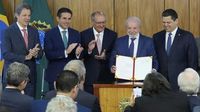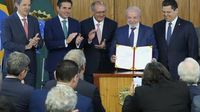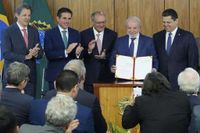On August 13, 2025, the Brazilian government stepped onto the world stage with a bold announcement: a sweeping support plan for exporters battered by newly imposed U.S. tariffs. Dubbed “Sovereign Brazil,” the initiative, revealed at a high-profile ceremony in Brasilia, promises a lifeline of 30 billion reais (about $5.5 billion) in credits and a suite of relief measures designed to shield local businesses from the economic aftershocks of a 50% tariff on Brazilian goods ordered by U.S. President Donald Trump.
The mood in the Planalto presidential palace was unmistakably charged. President Luiz Inácio Lula da Silva, flanked by Economy Minister Fernando Haddad, Vice President Geraldo Alckmin, Chamber of Deputies President Hugo Motta, and Senate President Davi Alcolumbre, addressed a packed room. The presence of top congressional leaders—united in public for the first time in months—underscored a rare moment of political consensus in Brazil, as lawmakers rallied around Lula in the face of what many see as an economic affront from Washington.
“We cannot be scared, nervous and anxious when there is a crisis. A crisis is for us to create new things,” Lula declared, his tone both defiant and optimistic, according to the Associated Press. He didn’t mince words about the U.S. move, adding, “In this case, what is unpleasant is that the reasons given to impose sanctions against Brazil do not exist.”
The plan itself is multifaceted. In addition to the hefty credit infusion, “Sovereign Brazil” postpones tax charges for companies hit by the tariffs, offers 5 billion reais (roughly $930,000) in tax credits to small and medium-sized businesses through 2026, and expands insurance for exporters facing canceled orders. The government will also incentivize public purchases of goods that can no longer find a home in the U.S. market. One particularly technical—but crucial—component is a one-year extension of tax credits for companies that import components to manufacture goods for export, a mechanism known as “drawback.”
Ricardo Alban, chairman of the Brazilian industry confederation, described the plan as “palliative, but necessary,” expressing hope that “this plan is behind us as quickly as possible.” In his view, “Nothing justifies us being on the lowest of tariffs to going to the highest of tariffs.”
The backstory to this economic standoff is as tangled as it is political. President Trump’s tariffs are reportedly tied to the ongoing judicial saga of his embattled ally, former Brazilian President Jair Bolsonaro, who remains under house arrest. Trump has echoed claims from Bolsonaro’s supporters that the former president’s prosecution for attempting to overturn his 2022 election loss represents a “deliberate breakdown in the rule of law,” with accusations of “politically motivated intimidation” and “human rights abuses.” Lula, for his part, has flatly rejected these assertions, insisting that “Brazil’s judiciary is independent” and that the executive branch has “no control over Supreme Court justices.”
“Our American friends, every time they decide to fight with someone, they try to create an image of a devil against the people they want to fight with,” Lula remarked pointedly. He pledged to seek out new markets for Brazilian goods shut out of the U.S., signaling a pragmatic shift in trade strategy. Lula also noted that, at least for now, Brazil would not retaliate by raising tariffs on American imports, though the option remains on the table under the country’s reciprocity law.
The timing of Bolsonaro’s trial, expected to reach its sentencing phase between September and October 2025, looms large over this diplomatic rift. Earlier in August, Justice Alexandre de Moraes, who is overseeing the Bolsonaro case, was himself sanctioned under the U.S. Magnitsky Act—a move intended to target serious human rights offenders. De Moraes has maintained that all defendants have been granted full due process.
The U.S. response to Brazil’s new plan was swift and, for many, surprising. Just hours after the “Sovereign Brazil” announcement, U.S. Secretary of State Marco Rubio unveiled fresh sanctions against at least two Brazilian officials. Rubio also broadened his criticism to include Brazil’s “More Doctors” program, a health initiative launched in 2013 that recruits thousands of Cuban doctors to work across the country. On social media, Rubio called the program “an unconscionable diplomatic scam of foreign ‘medical missions.’”
Brazil’s Health Minister Alexandre Padilha, who originally helped found the “More Doctors” initiative, was quick to defend it. “This program saves lives and it is approved by those who matter most: the Brazilian people,” Padilha asserted. “We will not bow to those who are against vaccines, against research, against science and now against two key people in my first tenure as health minister, Mozart Sales and Alberto Kleiman (who had their U.S. visas revoked).” According to the government, nearly 25,000 medical professionals are currently operating under the program, though officials did not specify how many are Cuban nationals.
Reactions within Brazil’s political class have been predictably polarized. Finance Minister Fernando Haddad characterized the U.S. measures as punishment for Brazil’s democratic resilience. “This one comes from the outside, but unfortunately it has the support of radicalized sections of Brazil’s society,” Haddad observed. Meanwhile, lawmaker Eduardo Bolsonaro, son of the former president, praised the American sanctions, stating, “This measure is a clear message: neither ministers, nor lower-tier bureaucrats nor their family members are immune. Sooner or later, everyone who contributed to support those (autocratic) regimes will answer for what they did — and there will be no place to hide.”
The larger question—whether economics or politics is truly driving the current U.S.-Brazil spat—remains open to debate. Lula’s poll numbers have climbed since the tariffs were announced, a fact not lost on observers who note the growing unity among Brazil’s political establishment in the face of external pressure. For now, at least, the “Sovereign Brazil” plan stands as a symbol of national resolve and a calculated effort to insulate the country’s exporters from the unpredictable winds of international politics.
As Brazil’s government seeks new markets, shores up domestic industries, and navigates the treacherous waters of global diplomacy, the coming months will test whether these emergency measures can truly steady the ship. The stakes, both economic and political, have rarely felt higher.



